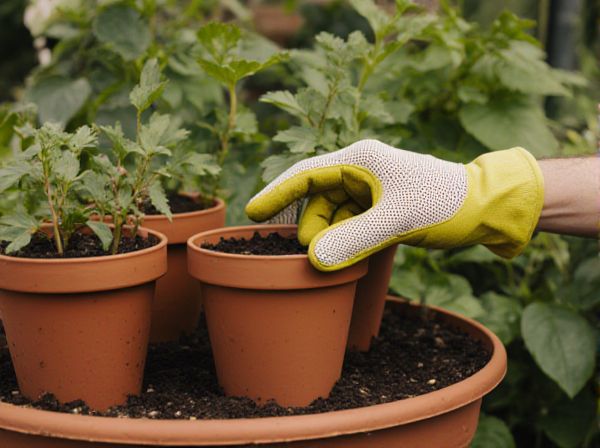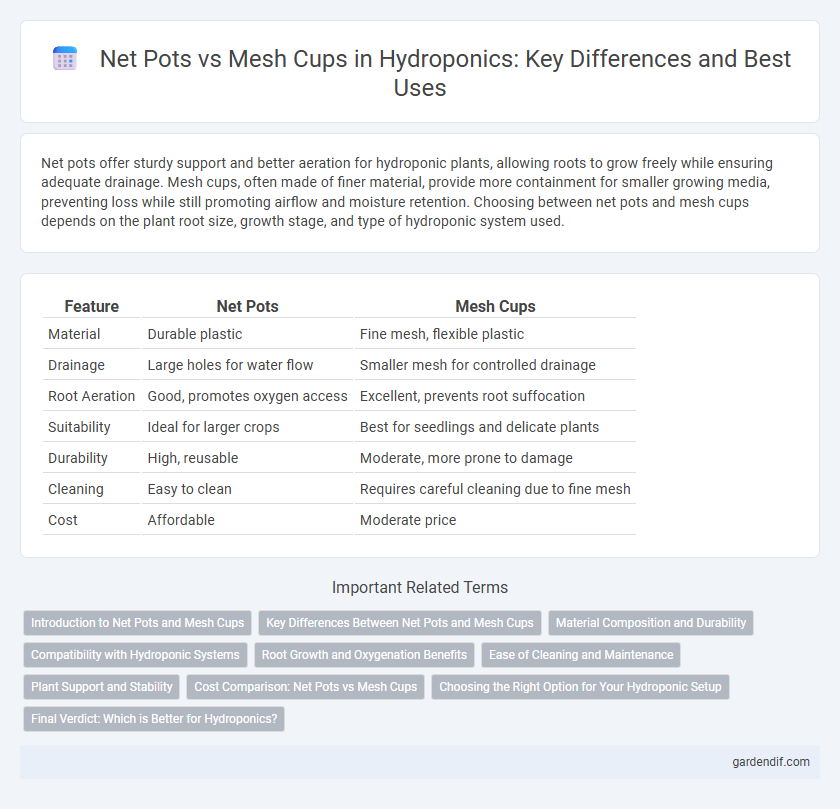
Net pots vs Mesh cups Illustration
Net pots offer sturdy support and better aeration for hydroponic plants, allowing roots to grow freely while ensuring adequate drainage. Mesh cups, often made of finer material, provide more containment for smaller growing media, preventing loss while still promoting airflow and moisture retention. Choosing between net pots and mesh cups depends on the plant root size, growth stage, and type of hydroponic system used.
Table of Comparison
| Feature | Net Pots | Mesh Cups |
|---|---|---|
| Material | Durable plastic | Fine mesh, flexible plastic |
| Drainage | Large holes for water flow | Smaller mesh for controlled drainage |
| Root Aeration | Good, promotes oxygen access | Excellent, prevents root suffocation |
| Suitability | Ideal for larger crops | Best for seedlings and delicate plants |
| Durability | High, reusable | Moderate, more prone to damage |
| Cleaning | Easy to clean | Requires careful cleaning due to fine mesh |
| Cost | Affordable | Moderate price |
Introduction to Net Pots and Mesh Cups
Net pots are durable containers with slotted sides designed to support plant roots while allowing optimal water and nutrient flow in hydroponic systems. Mesh cups, often made from flexible plastic, feature finer perforations that enhance aeration and drainage for delicate seedlings and smaller plants. Both net pots and mesh cups play crucial roles in ensuring efficient root oxygenation and nutrient uptake in soilless cultivation.
Key Differences Between Net Pots and Mesh Cups
Net pots feature rigid plastic construction with evenly spaced slits, allowing optimal root aeration and stability in hydroponic systems, while mesh cups are typically made from flexible, fine mesh material that promotes superior water flow and root pruning. The design differences influence plant growth; net pots provide sturdy support ideal for larger plants, whereas mesh cups facilitate faster nutrient absorption and are often preferred for seedlings or smaller crops. Choosing between the two depends on the specific hydroponic setup and crop requirements, balancing root health, aeration, and ease of maintenance.
Material Composition and Durability
Net pots are typically made from rigid plastic materials such as polypropylene, offering strong durability and resistance to water and nutrient solutions, ideal for long-term hydroponic use. Mesh cups, often constructed from flexible plastic or nylon mesh, provide enhanced aeration and root oxygenation but may degrade faster under prolonged exposure to UV light and nutrient-rich water. The choice between net pots and mesh cups balances material strength and longevity with optimal root health and growth conditions in hydroponic systems.
Compatibility with Hydroponic Systems
Net pots feature rigid structures compatible with various hydroponic systems such as NFT, DWC, and aeroponics, providing strong root support and optimal aeration. Mesh cups, constructed from flexible mesh materials, excel in aeration and drainage but may require specific system modifications due to their less rigid structure. Selecting between net pots and mesh cups depends on the hydroponic system design and plant root requirements to ensure maximum compatibility and growth efficiency.
Root Growth and Oxygenation Benefits
Net pots provide superior root growth and oxygenation benefits due to their rigid structure and larger openings, allowing roots to expand and access ample oxygen. Mesh cups, while lighter and more flexible, offer fewer ventilation opportunities, potentially limiting root aeration and development. Optimal hydroponic systems leverage net pots to maximize oxygen flow and robust root proliferation.
Ease of Cleaning and Maintenance
Net pots feature rigid plastic construction that resists clogging and allows easy cleaning with water or mild detergent, making them highly maintainable in hydroponic systems. Mesh cups, with their fine mesh structure, tend to trap debris and roots more easily, requiring more frequent and thorough cleaning to prevent blockages and disease. Choosing net pots enhances ease of maintenance by minimizing residue buildup and simplifying routine sanitation processes.
Plant Support and Stability
Net pots provide strong plant support and stability due to their rigid structure, making them ideal for holding larger plants securely. Mesh cups offer enhanced aeration and root exposure but may require additional support to prevent plant movement in hydroponic systems. Choosing between net pots and mesh cups depends on the specific plant's size and the desired balance between stability and root oxygenation.
Cost Comparison: Net Pots vs Mesh Cups
Net pots generally cost less than mesh cups, making them a budget-friendly option for hydroponic growers. Mesh cups, although slightly more expensive, offer enhanced durability and better root aeration, which can improve plant growth efficiency. The price difference varies depending on size and material quality, with net pots typically priced 20-30% lower than comparable mesh cups.
Choosing the Right Option for Your Hydroponic Setup
Net pots and mesh cups both serve as effective containers for hydroponic systems, but the choice depends on the plant type and root development needs. Net pots offer rigid support and are ideal for larger plants or heavy root systems, while mesh cups provide better aeration and drainage, promoting faster root growth in smaller or delicate plants. Selecting the right option enhances nutrient uptake and overall hydroponic yield, optimizing system efficiency and plant health.
Final Verdict: Which is Better for Hydroponics?
Net pots provide superior aeration and root growth due to their rigid structure and consistent size, making them ideal for most hydroponic systems. Mesh cups offer flexibility and cost-effectiveness but may degrade faster and provide less root support in nutrient-rich environments. For long-term hydroponic projects demanding stability and plant health, net pots are generally the better choice.
Net pots vs Mesh cups Infographic

 gardendif.com
gardendif.com